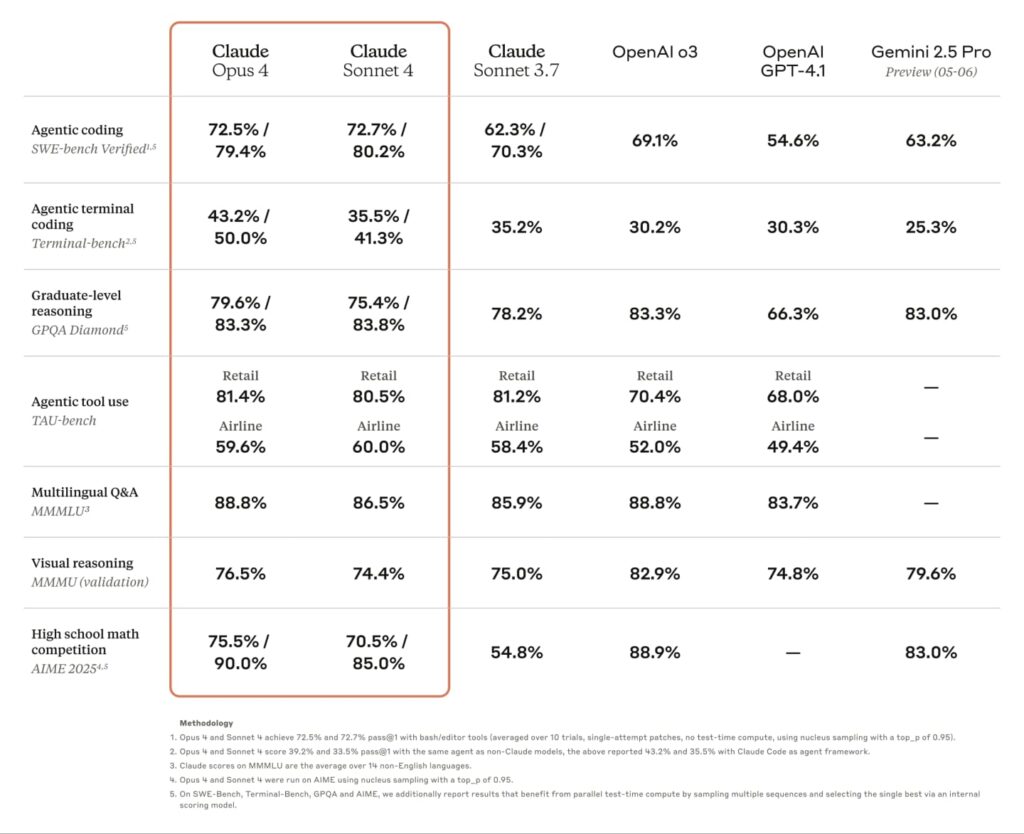Anthropic unveils Claude Opus 4 and Claude Sonnet 4 with long-form autonomy and top-tier coding performance. Anthropic Pushes AI Boundaries With Claude 4 Launch . Anthropic has officially released its most advanced AI models to date — Claude Opus 4 and Claude Sonnet 4 — positioning itself as a serious contender in the race against OpenAI, Google, and Meta. These new models are part of the Claude 4 family, optimized for reasoning, autonomy, and especially coding.
Claude Opus 4: The Most Powerful AI Coding Model in 2025
Described by Anthropic as the “best coding model in the world,” Claude Opus 4 is engineered for complex, long-running tasks. In customer tests, Opus 4 demonstrated the capability to operate autonomously for seven consecutive hours, marking a major leap in agentic AI capabilities.
According to Anthropic’s benchmarks, Claude Opus 4 outperformed GPT-4.1, Google Gemini 2.5 Pro, and OpenAI’s o3 model in coding and multi-step reasoning. This sets a new bar for AI-driven development environments, especially for businesses relying on automated workflows and software generation.
Claude Sonnet 4: High Performance Meets Affordability
Alongside Opus 4, Anthropic introduced Claude Sonnet 4, a mid-tier model that prioritizes efficiency and cost-effectiveness. Replacing the February-released Sonnet 3.7, this new version delivers enhanced precision, superior coding ability, and stronger contextual memory — all while being accessible to both developers and general users.
Sonnet 4 and Opus 4 are also 65% less likely to rely on shortcuts or flawed logic, which enhances safety and reliability — a key concern in enterprise-level AI integration.
Introducing “Thinking Summaries” and Extended Reasoning

Both Claude 4 models come equipped with new cognitive features:
Thinking Summaries: These condense the AI’s reasoning into clear, digestible insights for easier interpretation.
Extended Thinking (Beta): Users can toggle between reasoning and tool-usage modes, helping fine-tune how the model approaches complex queries or workflows.
These additions hint at Anthropic’s push toward transparency and controllability — two critical elements for enterprise adoption of AI.
Where to Access Claude Opus 4 and Sonnet 4
Claude 4 models are available through:
Anthropic API
Amazon Bedrock
Google Cloud Vertex AI
Users on Claude’s paid plans gain access to both Opus 4 and Sonnet 4, including the “extended thinking” beta feature. Free-tier users, however, are limited to Claude Sonnet 4 for now.
Claude Code Agent Is Now Generally Available
Another exciting development is the Claude Code agent, now officially available to all users after its preview phase in February. This AI-powered command-line assistant is designed to streamline development tasks and could rival tools like GitHub Copilot in agentic automation.
Anthropic to Deliver More Frequent Model Updates
In response to rapid advancements from competitors like OpenAI, Google DeepMind, and Meta, Anthropic announced a new strategy focused on frequent model refreshes. This means faster iterations, improved reliability, and continuous enhancements in Claude’s reasoning, safety, and capabilities.
Example : What Is Prostate Cancer and Why It Matters
Though not directly tied to this AI announcement, it’s worth briefly explaining recent health concerns trending online, such as prostate cancer, due to their impact on public figures and health awareness.
Prostate cancer is a disease where malignant cells form in the tissues of the prostate. Symptoms may include difficulty urinating, pelvic discomfort, or blood in the urine. It can often be detected early through PSA (prostate-specific antigen) testing.
When left untreated, aggressive forms of the disease can metastasize to the bones, as was reportedly the case with former President Joe Biden. However, early diagnosis, hormonal therapy, and modern treatments have significantly improved survival rates.
Conclusion
The launch of Claude Opus 4 and Claude Sonnet 4 marks a pivotal shift in AI development. With unparalleled autonomy, industry-leading coding capabilities, and user-friendly features, Anthropic is not just keeping pace — it’s pushing the boundaries of what’s possible with generative AI in 2025.
If you’re a developer, researcher, or enterprise looking to harness AI for long-form problem-solving or software development, the Claude 4 models are worth exploring.
Also Read : Google Veo 3: How to Use the Free AI Video Tool 2025 Step-by-Step Guide